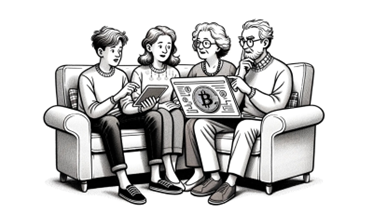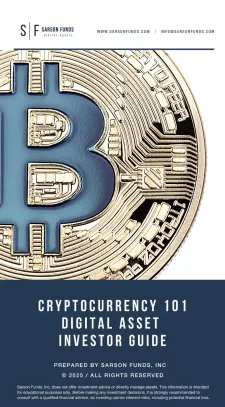
We know you aren’t going to like hearing this, but as Bob Dylan once said, “The times, they are a-changing.” We are writing because we want to fill you in on a major change, we see happening around the globe specifically Bitcoin and blockchains. It strikes at the heart of global finance and could introduce unwanted volatility into your retirement plans.
The change is coming in the form of Bitcoin, the world’s first “non-sovereign” globally traded currency. Bitcoin and blockchains dramatic growth should be viewed as a yardstick by which to measure the dysfunction of the current global financial system. As governments around the world have abandoned fiscal disciplines and have allowed their money-printing policies to run amok, investors have flocked to Bitcoin and blockchains.
In the United States, among our many other blessings, we have enjoyed a stable currency that is happily accepted around the world. This makes us uniquely blind to see the revolution that is being ushered in by Bitcoin and blockchains. Already, hundreds of millions of people around the world have started experimenting with “blockchain technology” powered digital currency.
Simply put, blockchain technology is a method for combining computer networks and statistical mathematics to create ultra-secure “trustless” public ledgers. The process empowers digital currencies like Bitcoin by solving a multi-century old problem that have plagued paper currencies since their invention in China in 1262AD, specifically the “double-spend and double-print problems”. This means that users of a cryptocurrency no longer need to rely upon a “trusted third party” to ensure the validity and immutability of transactions. It’s also offering people around the world an exit from the current fiat system and the war-funding machine that it is starting to represent.
We believe that this could potentially be very disruptive to the current global financial landscape, considering our current banking system, at its core, is just a large group of “trusted third parties”. These banks, such as JP Morgan, the Bank of England, Bank of America (each complicit in some way or another) have the role of verifying that funds are where people say they are and that the people moving the funds are authorized to do so. With cryptocurrencies, these verification processes, fees, and delay become unnecessary. Transactions are faster, cheaper, and verifiable.
In less than a decade, cryptocurrencies have evolved from a fringe fintech “white paper” to something even the Federal Reserve is labeling as a “new asset class”.
Bitcoin and blockchains are catching on in different places for different reasons. While technologically advanced Japan was the first major country to officially recognize Bitcoin as legal tender, it was the cash-starved government of Venezuela in 2019 that first gained global headlines with the announcement that it would accept Bitcoin and Litecoin for tax payments. More recently, others like El Salvador have publicly made bitcoin legal tender, while many more such as Turkey, Switzerland, Singapore, UAE, Portugal, Argentina, Togo, Columbia, Vietnam, India, Pakistan, Nigeria, and the Philippines are seeing exponential usage growth.
Institutions are flocking to bitcoin too. Europe’s largest bank HSBC, France’s largest bank Société General, Germany’s second largest stock exchange, along with Japan’s largest bank, Mitsubishi Bank, Swiss banking giant Julius Baer and, of course, BlackRock here in the United States, have all announced bitcoin initiatives or plans to offer cryptocurrency exchange and custody services.
Before the advent of cryptocurrency, you could video chat with someone in a remote corner of the world. But you couldn’t send that same person a dollar, or even a penny – at least not efficiently. Before Bitcoin, the only option for sending money to far-flung locales like Bhutan or Bahrain was the international Fed-Wire system. A process which takes several days and incurs of around $50 dollars in fees. This is certainly problematic for a $1 transaction and doubly problematic if either party happens to be a part of the world’s 1.8 billion people without access to Western banking. Crypto, led by Bitcoin, are changing that.
Closer to home, it seems Wall Street is waking up to the opportunity. Which is a reason we are bringing this to your attention now. It seems we may have finally reached a tipping point on cryptocurrency investing.
Where Bitcoin and blockchains go from here is the big unknown. In this new paradigm, some companies will adapt and thrive, and others will face obsolescence. We believe that we are still in the early innings of the crypto and blockchain technology revolution. More upside remains – especially for nimble investors that can build positions ahead of the anticipated deluge of institutional money that is expected to be allocated to the space in the coming years.
So, Mom and Dad, don’t dismiss this digital currency and blockchain revolution. Take some time, do your research and ask questions. Because like Dylan said, “…keep your eyes wide, the chance won’t come again…”
Peace, Love and Respect,
Your Kids Working at www.SarsonFunds.com
Disclosures: Not investment advice. It should be assumed that Sarson Funds or its affiliated managers hold positions in all projects that are discussed. It is not possible to invest in any project directly through Sarson Funds, Inc. or its affiliated managers. Any investment product offered by managers affiliated with Sarson Funds should be assumed to be only available to Accredited Investors and subject to the individual terms and conditions of that offering including but not limited to those eligibility requirements associated with U.S. Securities Regulation D, section 506c. Talk with your financial advisor before making any investment decisions or have them contact Sarson Funds directly at [email protected].








